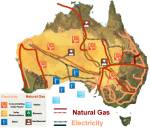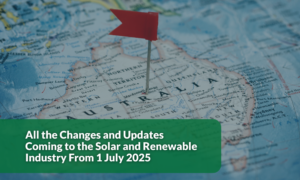A massive retirement of coal-fired power generation plants is looming in Australia and globally. This presents the nation a unique opportunity to move away from the filthy fossil fuel for generating electricity and fully embrace it’s range of renewable energy resources.
Starting this year, many of our current coal-fired capacity will reach 40+ years of age and need replacement. “Clean coal” and carbon capture and storage (CCS) won’t be ready. Carbon capture and storage has proven itself technologically feasible, but it comes at a high cost and carbon emission reductions have been less than expected.
Natural gas and renewables like wind energy, solar power and geothermal technologies are already available to replace retired coal-fired power.
In “Australia 2050: Clean Energy Superpower,” DESERTEC-Australia proposes that over the next decade, Australia mothballs coal-fired power generation and replaces it with natural gas power and renewable energy sources to create significant near term greenhouse gas reductions.
After that time, Australia will begin generating very large amounts of power to the grid and freed surpluses of renewable energy can then be redirected to export markets over High Voltage Direct Current (HVDC) power lines connecting Australia to Asia.
According to DESERTEC-Australia, by 2040, the region could benefit from what it calls a “Pan-Asian energy superhighway”, allowing increased cross border trade and greater regional security of supply in electricity and natural gas. A combination of gas pipeline and HVDC system from Australia could provide China and the economies of Northeast Asia as much as 10,000 terrawatt hours of electricity a year; enough to satisfy more than a third of China’s energy needs in 2050.
The organisation says renewable energy is rapidly becoming price competitive and in a rationally-priced market, renewables are now cheaper now than most fossil fuels for forward planning of new capacity.
Siemens Ltd also recently backed the idea of a large solar power electricity generation plant to be established in central Australia, stating a solar farm occupying 30km x 30km of land and consisting of solar panels would be enough to provide Australia’s day time energy needs.
DESERTEC-Australia is composed of engineers, businesses, government officials and others who support the concept of generating large amounts of solar energy from the Earth’s arid areas.
National solar solutions provider Energy Matters recently signed up as a supporter of DESERTEC-Australia. According to the company’s co-founder, Max Sylvester, “Through initiatives such as those proposed by DESERTEC-Australia, our nation has a chance of moving from having the dubious distinction of having the highest per-capita carbon emissions globally, to becoming a world leader in the generation of clean and renewable energy.”
“This doesn’t have to be about taking jobs from the coal industry, rather transferring them to the cleantech sector. Reduced revenue from coal exports can be offset by exporting electricity and cleaner energy sources – and the spin-off industries from such a change in direction would be incredible. In a relatively short space of time, we could break our fossil fuel addiction for power generation altogether.”
DESERTEC was founded in 2003. It initially centred upon developing and transporting clean solar energy from the Sahara Desert and North Africa to Europe. The concept has spread and the Foundation is active in the United States, India, Australia and elsewhere.












































